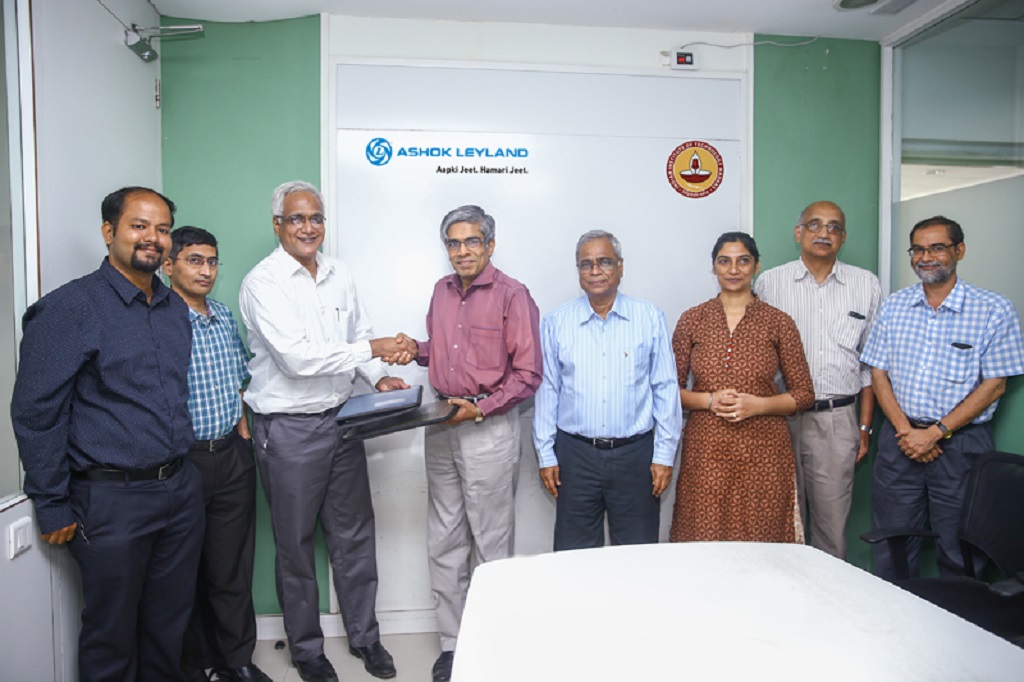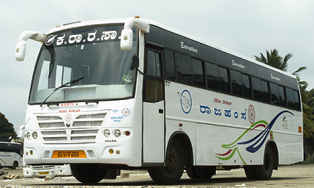
· IIT Madras is the first institution to set up such an initiative to develop the Electric Mobility ecosystem in India with industry participation
· The objective of this MOU is to promote R&D activities for strengthening battery engineering and related sub-parts, especially for Electric Vehicles
· Ashok Leyland will provide a funding of INR 1.5 Cr over a 5-year period to Centre of Battery Engineering at IIT-Madras
22nd August, 2017, Chennai: Ashok Leyland, flagship of the Hinduja Group, and Indian Institute of Technology Madras (IIT Madras) signed a Memorandum of Understanding (MOU), on 19th August 2017, for Ashok Leyland to sponsor the Centre of Battery Engineering (CoBE) at IIT Madras. The CoBE will seek to supplement the on-going research by facilitating collaboration between industry and researchers, which is currently lacking, to study various battery characteristics that are not completely understood even among Global players.
Commenting on this landmark initiative, Mr. Karthick Athmanathan, Head, Electric Vehicles and e-Mobility Solutions, at Ashok Leyland, said, “Ashok Leyland has been leading in pioneering technologies and disruptions in the commercial vehicle space. Everything that we do and strive to achieve is linked to our philosophy, ‘Aapki Jeet, Hamari Jeet’. Whether it was meeting the BS-III norms with a mechanical fuel pump or being the first OEM to introduce an all-electric bus, Circuit, or the latest innovation, iEGR technology for BS-IV engines – we have always delivered on our promise to help our customers and partners win. With this initiative in battery engineering, we want to be participants in India’s aggressive push to stay ahead of the curve as far as electric mobility is concerned. We are confident that, with the high quality of people and the special list of research initiatives, CoBE at IITM will be a key partner in the country’s electric mobility vision and will help us understand this technology better and stay ahead of global players. We are committed to the Government’s vision for eMobility and want to develop the ecosystem which will help us come up with customised EV solutions for our country.”
Sharing his views about the MoU, Prof. Bhaskar Ramamurthi, Director, IIT Madras, said, “Battery Engineering, specifically for electric vehicles, is a very important emerging area of research and innovation. By pledging long-term support and collaborating with the CoBE at IIT Madras, Ashok Leyland is making a significant contribution to this critical technology for India’s future energy and transportation needs.”
Prof. Devendra Jalihal, Head, Department of Electrical Engineering, IIT-Madras, under which the CoBE, functions, signed the MoU. He said, “The CoBE, IIT Madras, is carrying out exciting multi-disciplinary research work in several areas related to battery and electric vehicles including battery management systems, battery testing, battery charging and developing national standards for communication between EV and the cloud servers. The CoBE also provides policy inputs to the national Electric Vehicles program. Potentially, the research can lead to greatly reducing India’s dependency on imported oil, to reducing environmental pollution, to greater employment opportunities and to global leadership position.”
IIT Madras has a great track record of working with industry leaders and innovators. The institution has come up with solutions which are business worthy and helps take the technological capability of the industry a step further. For Ashok Leyland, being a part of the CoBE is a very significant step in its journey and it has the potential to help the company understand battery technology as it proliferates the market with its Electric Vehicles with different architectures for different applications. In addition to joining the panel of sponsors of CoBE, Ashok Leyland is also keen on carrying out a fair amount of confidential consulting research projects with CoBE over the next few years. This will not only help the company evolve as a competitive player and India-optimised solutions provider for its customers but also help realising its ambition to stay ahead of global practices in this domain as the fourth largest Bus Maker in the world.
This landmark tie-up will aim to achieve the following objectives:
- CoBE will work towards understanding various battery issues and challenges in various areas of applications. It will also undertake high quality research projects to overcome these challenges.
- It will focus on the physics part of the battery technology as against other research units working on newer chemistries of the batteries. CoBE will target to work upon Battery Engineering and thorough characterisation of batteries via detailed testing, optimising battery performance for different applications and work towards better economics.
- CoBE will collaborate with various cell manufacturers from across the world, procure cells and characterise them to create a knowledge centre on available cells, providing industry with valuable data to select appropriate solutions.
- It will study the impact of partial charge-discharge cycles with varying depths of discharge and operating temperatures on battery life.
- It will work on developing the next generation of smart battery chargers and Battery Management protocols. By working on the design configurations, and packaging cells into modules differently, optimisation studies on batteries for different lifetime for different applications will be undertaken
Additionally, CoBE will play a larger role of coordinating synergy among various industry partners to develop a holistic cooperation model across entire value chain of EV Batteries. It will also be doing consulting for Ashok Leyland as well as others in niche and IPR-intensive areas where there is a need for in-depth testing and development, including simulations. Through this partnership, Ashok Leyland aims to support the EV ecosystem at a national level to bring the industry up to speed considering the limited skills in the country as on date.
About IITM (www.iitm.ac.in)
Indian Institute of Technology Madras (IITM) was established in 1959 by the Government of India as an Institute of national importance. The activities of the Institute in various fields of Technology and Science are carried out in 16 academic departments and several advanced interdisciplinary Research Academic Centres. The Institute offers undergraduate and post – graduate programmes leading to the B.Tech., M.Sc., M.B.A., M.Tech., M.S., and Ph.D., degrees in a variety of specialisations. IITM is a residential institute with more than 550 faculty and 9000 students. Students from 18 countries are enrolled here. The campus is self-contained and is located on a beautiful wooded area of about 250 hectares. IITM fosters an active entrepreneurial culture with strong curricular support and through the IITM Incubation Cell (www.incubation.iitm.ac.in).
IIT M has been ranked No.1 amongst Engineering Institutions in the India Rankings 2016 and 2017 and No.2 in the category of Overall Institutions in the 2017 Rankings, released by the National Institutional Ranking Framework, MHRD, Government of India

